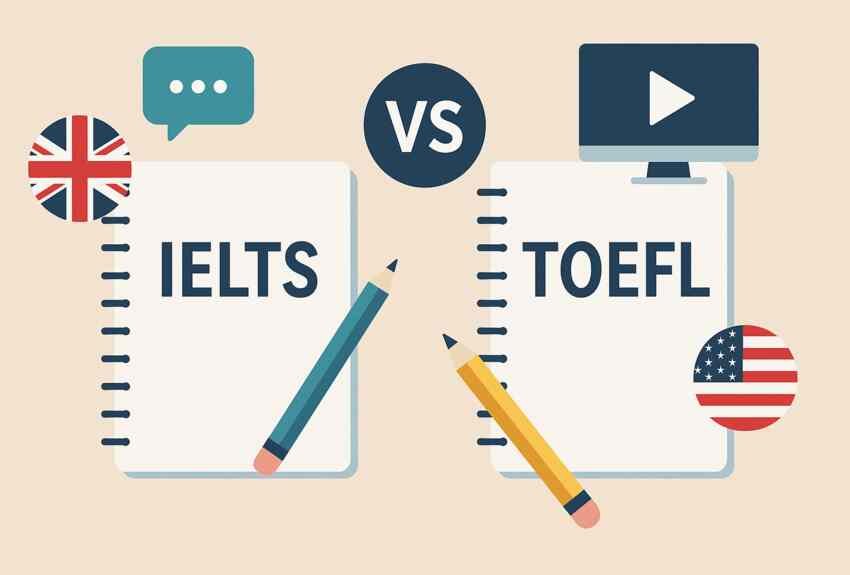
If you’re planning to study abroad, you’ve probably come across the terms IELTS and TOEFL. These are two of the most popular English proficiency tests required by universities worldwide. Deciding between the two can feel overwhelming, especially when both tests assess similar skills. This guide breaks down the key differences to help you choose the right test based on your needs.
What Are IELTS and TOEFL?
- IELTS (International English Language Testing System): Preferred in the UK, Europe, and Australia, IELTS is known for its practical approach to testing English proficiency. It offers both Academic and General Training modules.
- TOEFL (Test of English as a Foreign Language): Widely accepted in the US and Canada, TOEFL focuses on academic English, making it ideal for university applications.
Key Differences Between IELTS and TOEFL
| Aspect | IELTS | TOEFL |
| Test Format | Paper-based or Computer-based | Computer-based |
| Duration | 2 hours 45 minutes | Around 4 hours |
| Speaking Section | Face-to-face with an examiner | Recorded responses evaluated later |
| Writing Section | Two tasks: Essay and chart/graph description | Two tasks: Essay and integrated writing task |
| Scoring System | Band score (1 to 9) | Total score out of 120 |
| Accent Exposure | Includes British, Australian, and American accents | Mostly American accent |
| Cost | $215 – $250 | $180 – $235 |
| Test Centers | Over 1,600 worldwide | Over 4,500 worldwide |
| Acceptance | Popular in the UK, Europe, and Australia | Widely accepted in the US and Canada |
Which Test Is Easier: IELTS or TOEFL?
- Listening Section:
- IELTS has shorter recordings with diverse accents, making it challenging for those unfamiliar with British or Australian accents.
- TOEFL uses longer American-accented recordings, which require good concentration.
- Speaking Section:
- IELTS involves a face-to-face interaction, which can be intimidating but allows for natural conversation.
- TOEFL requires speaking into a microphone, which some students find more comfortable.
- Writing Section:
- IELTS evaluates both creative writing and analytical skills through graph descriptions and essays.
- TOEFL focuses on academic writing with essays and integrated tasks.
Verdict: It depends on your comfort level. Students who prefer face-to-face communication may find IELTS easier, while those comfortable with typing and technology might prefer TOEFL.
How to Decide Between IELTS and TOEFL?
| Factor | Choose IELTS | Choose TOEFL |
| Destination | UK, Australia, New Zealand, or Europe | USA or Canada |
| Test Environment | Comfortable with face-to-face speaking | Prefer speaking into a microphone |
| English Exposure | Familiar with multiple accents | Prefer American English |
| Test Format | Flexible (paper or computer-based) | Prefer computer-based testing |
Pros and Cons of IELTS and TOEFL
IELTS Pros
- Offers more test dates and centers worldwide.
- Tests a wider range of English accents.
- Flexibility to choose paper or computer-based tests.
IELTS Cons
- Face-to-face speaking might be stressful for some students.
- Slightly more expensive in certain countries.
TOEFL Pros
- Preferred by most US and Canadian universities.
- Computer-based format makes it consistent.
- Easy-to-understand scoring system.
TOEFL Cons
- Requires sitting through a 4-hour test.
- Focuses heavily on academic English.
Tips to Choose the Right Test
Know Your Study Destination: Check if your target universities prefer IELTS or TOEFL.
- Consider Your Strengths: Choose IELTS if you’re confident in interpersonal communication; opt for TOEFL if you excel in technology-driven tests.
- Evaluate Cost and Location: Look for nearby test centers and compare fees in your country.
- Take Practice Tests: Try sample questions for both tests to identify which one suits you better.
Conclusion
Both IELTS and TOEFL are widely accepted, and neither is inherently better than the other. Your choice should align with your study goals, personal strengths, and target university requirements. Proper preparation and practice can make all the difference in acing either test.
Comparison Table at a Glance
| Test | Best For | Main Advantage | Primary Challenge |
| IELTS | UK, Europe, Australia, New Zealand | Flexible format, diverse accents | Face-to-face speaking |
| TOEFL | USA, Canada | Comprehensive academic focus | Longer test duration |
Start preparing early, and whichever test you choose, give it your best shot! Good luck! 🎓
